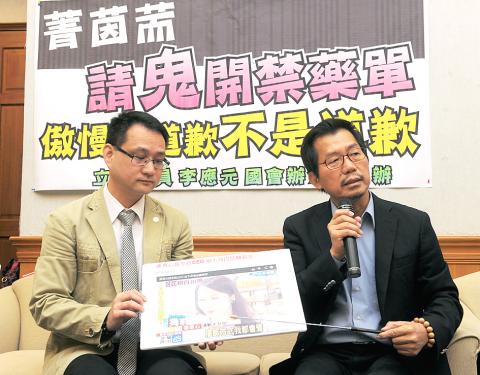Former vice president Lien Chan (連戰) yesterday defended his daughter Lien Hui-hsin’s (連惠心) investment in a nutrition supplement company whose weight-loss pills were found to contain unauthorized drugs, and said there may be political influence behind the investigation into the company.
Lien Hui-hsin on Sunday admitted she had invested in Geneherbs Biotechnology Co (菁茵荋生物科技). She had previously denied any involvement in the management of the firm.
Controversies over her promotion of the company’s products arose after Taipei City’s Department of Health confirmed that the firm’s weight-loss product — Wellslim Plus+ — contained cetilistat, a lipase inhibitor designed to treat obesity.

Photo: CNA
Lien Chan, a former Chinese Nationalist Party (KMT) chairman, said he has absolute confidence in his daughter and her handling of the situation, and said she will resolve the dispute with sincerity and well-thought consideration.
“As a citizen, I am against any food product or drug that damages public health. However, I also do not want to see any improper force influence the authorities’ handling of the case,” he said in response to reporters’ questions.
He added that he did not exclude the possibility that the case was being politically manipulated, but he did not elaborate.
He said he took Wellslim Plus+ and was “still very healthy.”
Democratic Progressive Party (DPP) Taipei City Councilor Juan Chao-hsiung (阮昭雄) first raised questions about the pills, and the city’s health department later reported the company to prosecutors after confirming that the pills contained unauthorized drugs.
Taipei Mayor Hau Lung-bin (郝龍斌) yesterday said public figures or celebrities should be more cautious about advertising products. He also said the city government would help consumers who had purchased the pills seek compensation from the company.
Hau said his close friendship with Lien Chan and his family would not impact the city’s handling of the matter.
Meanwhile, Premier Jiang Yi-huah (江宜樺) denied that political influence had been a factor in the investigation into the content of Wellslim Plus+.
“At least I was not involved in the controversy... And I believe that the local prosecutors’ office will investigate the case fairly,” Jiang said in response to a question from DPP Legislator Chen Chi-mai (陳其邁) during a question-and-answer session at the legislature.
While saying she was a shareholder in the company, Lien Hui-hsin on Sunday questioned the timing of the probe as well as the extensive media coverage, saying that political influence could be a factor.
There have been rumors that relationship between the Lien family and President Ma Ying-jeou (馬英九) has soured because of Ma’s perceived passiveness toward further investigations into the shooting of former Taipei EasyCard Corp chairman Sean Lien (連勝文) during a campaign rally in November 2010 as well as the election-eve shooting of then-president Chen Shui-bian (陳水扁) and then-vice president Annette Lu (呂秀蓮) on March 19 2004, who were running against Lien Chan and People First Party Chairman James Soong (宋楚瑜).
Sean Lien is regarded as a popular candidate for next year’s Taipei mayoral election, although he has not said whether he is interested in running.
Additional reporting by staff writer

A car bomb killed a senior Russian general in southern Moscow yesterday morning, the latest high-profile army figure to be blown up in a blast that came just hours after Russian and Ukrainian delegates held separate talks in Miami on a plan to end the war. Kyiv has not commented on the incident, but Russian investigators said they were probing whether the blast was “linked” to “Ukrainian special forces.” The attack was similar to other assassinations of generals and pro-war figures that have either been claimed, or are widely believed to have been orchestrated, by Ukraine. Russian Lieutenant General Fanil Sarvarov, 56, head

SAFETY FIRST: Double the number of police were deployed at the Taipei Marathon, while other cities released plans to bolster public event safety Authorities across Taiwan have stepped up security measures ahead of Christmas and New Year events, following a knife and smoke bomb attack in Taipei on Friday that left four people dead and 11 injured. In a bid to prevent potential copycat incidents, police deployments have been expanded for large gatherings, transport hubs, and other crowded public spaces, according to official statements from police and city authorities. Taipei Mayor Chiang Wan-an (蔣萬安) said the city has “comprehensively raised security readiness” in crowded areas, increased police deployments with armed officers, and intensified patrols during weekends and nighttime hours. For large-scale events, security checkpoints and explosives

PUBLIC SAFETY: The premier said that security would be tightened in transport hubs, while President Lai commended the public for their bravery The government is to deploy more police, including rapid response units, in crowded public areas to ensure a swift response to any threats, President William Lai (賴清德) said yesterday after a knife attack killed three people and injured 11 in Taipei the previous day. Lai made the remarks following a briefing by the National Police Agency on the progress of the investigation, saying that the attack underscored the importance of cooperation in public security between the central and local governments. The attack unfolded in the early evening on Friday around Taipei Main Station’s M7 exit and later near the Taipei MRT’s Zhongshan

REBUFFED: In response to Chinese criticism over recent arms sales, Washington urged Beijing to engage in meaningful dialogue instead of threats and intimidation Washington’s long-term commitment to Taiwan would not change, the US Department of State said yesterday, urging Beijing to stop pressuring Taiwan and engage in meaningful bilateral dialogues. The remarks came in response to a backlash from Beijing about Washington’s latest approval of arms sales to Taiwan. The US Defense Security Cooperation Agency said in a statement on Wednesday that the Taipei Economic and Cultural Representative Office in the US has asked to purchase an arms package, including Tactical Mission Network Software; AH-1W helicopter spare and repair parts; M109A7 self-propelled howitzers; HIMARS long range precision strike systems; tube-launched, optically tracked, wire-guided missiles; Javelin